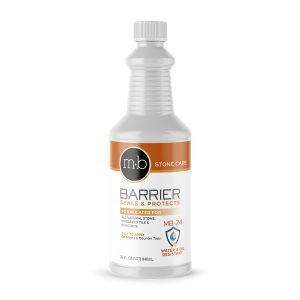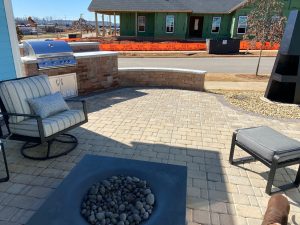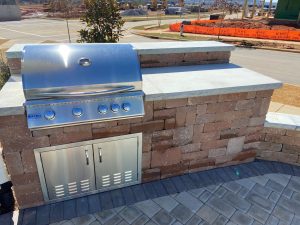Sealing granite countertops yourself is easy!
Sealing granite may be critical to making sure your countertops are protected from staining. This article will help you understand granite sealing and determine how well your tops are protected. You’ll also learn how to properly seal granite countertops yourself!
Yes, you can easily seal your own granite countertops with professional quality … probably better than your granite contractor or builder provided. See recommended granite sealers below.
Do All Granite Tops Need To Be Sealed?
But first, did you know that your granite counters may or may not need granite sealer? “Granites” vary in how porous they are and how susceptible to staining they are. Actually, the color and patterning of your granite can indicate how porous your countertops may be.
Should you seal granite countertops in the first place? I believe that sealing granite countertops has become a misunderstood practice and a misused marketing tactic, the result of both ignorance in the countertop industry and maybe even malicious intent.
Granite sealer is over-promoted and over-applied. Some stone countertops need it. Some don’t.
VIDEO – New Home Countertop Protection Indoors & Outdoors . . . protect floors too!
Should I seal my granite?
Granites vary in how porous they are. Actually, some granites never need sealer and should never be sealed. This goes for most black granite countertops which are typically very dense and will neither stain nor absorb sealer. Other stones may need several coats of sealer.
Understand that stone that is commonly classified as granite has much different needs than marble or limestone. These are calcite-based stones which react to acids and are typically more porous and subject to “etching”. Make sure you know what your stone is. Test your stone to see if it needs sealer with a Lemon Juice Test. Place a few drops of lemon juice in an inconspicuous place.
If dark spots appear quickly, the stone is potentially a problem since it is reacting with an acid. There’s a chance the stone is calcite-based, perhaps limestone, and will be a problem to seal. If the drops take a minute or so to be absorbed, granite sealer can be used to protect the tops. If the lemon juice doesn’t get absorbed at all, your stone does not need to be sealed.
 Sealing Granite Countertops Properly
Sealing Granite Countertops Properly
Many granite contractors and installers choose to use low quality silicon or siloxane-based granite sealers (that’s if any sealer was applied at all!) Sealers of this type are common in the granite countertop industry and require re-application every 6 months or one time per year. A better granite sealer is fluorocarbon alphatic resin sealer.
Unlike silicon-based sealers, these will not evaporate or go through any type of natural degradation. Fluorocarbon alphatic resin is more expensive than lesser quality sealers, but you get what you pay for. And in this case it’s both stain protection and peace of mind.
Quality granite sealers or impregnators penetrate below the surface rather than sit on it like topical sealers. The sealing substance is delivered inside the stone by natural absorption.
Sealer/Impregnator consists of a solid resin (which seals the “pores” of the stone), and a solvent or water “carrier” to deliver the resin into the stone.
Note: With calcite-based stones like marble, onyx, or limestone, no matter what sealer you use, you cannot avoid the damage caused by acids. Anyone who tells you differently is not being truthful.
How To Seal Granite Countertops
Sealing granite countertops is as easy as spray on, let sit, and wipe off. It literally takes minutes. And if you’re using a high quality alphatic resin granite sealer, you don’t need to keep re-applying over the years.
As a granite fabricator and installer, we always degrease countertops and give them their final cleaning with denatured alcohol. For daily granite care, see how to clean granite countertops daily. Denatured alcohol, it turns out, does wonders for cleaning granite and cutting through film buildup on your counters. The result is the original shiny surface.
If you apply sealer to a stone that doesn’t need it and won’t absorb it, some sealer will remain on the surface of the stone. Especially with dark color stones, damage may appear such as “ghost water stains” or “water rings”. The granite isn’t stained. In fact, you can consider the sealer is what has created the look of a stain. Don’t seal granite tops if they don’t need it. See How To Remove Granite Stains.
Seal Grout Lines Especially In A Newly Built Home
Grout is typically porous and especially subject to staining. You should always seal grout lines. Start with a good cleaning, even if your tile and grout are newly installed – best way to clean grout. Seal grout lines with multiple coats using the best sealer you can. Here are video instructions for cleaning grout and sealing grout.
Recommended Granite Sealers
For years, my granite countertop company sealed all granite and natural stone with MB24 Barrier, a water-based penetrating fluorocarbon alphatic resin sealer. This product effectively protected thousands of stone countertops that we installed. It provided stain resistance and easier stain clean up. The purpose of the sealer is not always to prevent a stain, but to allow you to remove the stain easily.
Multiple applications were usually needed, especially on very light-colored stone countertops. When properly applied and cared for, MB24 protects for 3 to 5 years.
Permanent Granite Countertop Sealer
A couple of years ago, we switched to a new penetrating sealer and color enhancer. MB21 from MB Stone Care is a professional grade, permanent stone sealer. It exceeds MB24 in performance, providing optimum protection from oil and water-based stains. This sealer is made for stone kitchen countertops and is safe to use in food prep areas and typically not harmed by acidic household cleaners.
It’s easy to apply and typically, two coats are suggested. The result is a permanent seal for stone countertops. MB21 is also my “go to” permanent grout sealer.
How To Seal Granite Countertops With Permanent Granite Sealer
To permanently seal granite counters, first provide a thorough cleaning and degreasing with denatured alcohol. I like to apply MB-21 with a sprayer. Spray the sealer liberally onto the countertops. Wait 10 minutes and apply more. After another 10 minutes wipe up excess sealer with a dry cloth or towel.
Always wipe up extra sealer after you’re done and don’t allow the sealer to dry on the counters. If it does dry while it’s sitting, spray more sealer onto the tops. Then wipe of the excess. When finished, buff the tops with a white Scotch Brite pad to remove any leftover sealer.
What Else Should I Seal?
Besides protecting natural stone surfaces with granite and stone sealer, you can also protect other porous surfaces. Granite sealer can protect brick, masonry, concrete, and terra cotta surfaces. Do quartz countertops need to be sealed?
Sealing granite tables . . . should I seal my granite tables?
Here’s a good question: Do granite top tables need to be sealed? If you’re going to place food or drinks on a granite table, it’s a good idea to seal it. Here’s what you need to know about sealing granite & marble tables . . . stain removal too – Recommended granite & marble table sealing procedures.
How To Seal & Protect Granite Counters in Hotels, Restaurants, Bars, and Offices
Sealing and protecting granite tops in public and commercial spaces is no different that sealing countertops in your home. See How To Seal Granite Tops In Hotels, Restaurants, and Bars With Permanent Stain Protection
Countertop Care & Precautions
Certain habits can eliminate maintenance issues with your natural stone and granite countertops. Use coasters under all glasses, particularly those containing alcohol or citrus juices.
Many common foods contain acids that can dull or etch the surface of many calcium based stones like marble or limestone. Use trivets or mats under hot dishes and placemats under china, ceramics, silver, or other objects that can scratch the surface.
Good news is, granite counters don’t usually need the same care as other stones.
What’s the best sealer for granite countertops?
Should I use special granite cleaner for my countertops?
Can I repair a chip in my granite counters?
How to seal marble
How to seal limestone counters
Sealing Granite and Concrete Outdoors


Return from Sealing Granite Countertops to Granite Care Pro Home